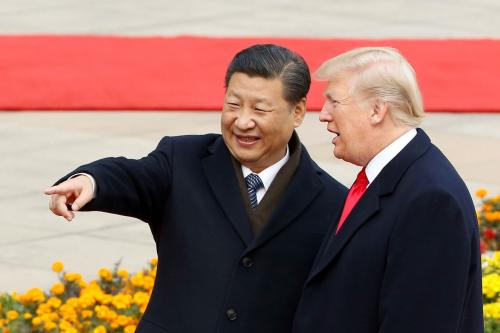Though news on the conflict in South Sudan has begun to be overshadowed, negotiations and reports of violence still continue in this small country. Importantly, the crisis in South Sudan has a regional bend: Regional states, especially Kenya, are concerned that the repercussions from the prolonged conflict could compromise regional security, peace and stability, thus undermining their economic, political and security interests. Being a close neighbor on the northern frontier, a protracted conflict in South Sudan will affect Kenya in terms of trade and investment, infrastructure projects and influx of refugees.
The signing of the Intergovernmental Authority on Development (IGAD)-mediated cease-fire by the South Sudan government and the rebels on January 23, 2014 in Addis Ababa marked the first phase of the peace process. This agreement was hailed by regional states and the rest of the international community as a major breakthrough in resolving the young republic’s crisis, which had begun as a power struggle among politicians and escalated to a major conflict engulfing the military, political leadership and civilian population throughout the country.
Though the second phase of peace talks began in mid-February, the process has faced seemingly insurmountable challenges as the rebel delegations insist that serious negotiations will only take place after the release of the remaining four detainees and the withdrawal of Uganda People’s Defense Force (UPDF) from South Sudan. At the same time, there have been cases of the parties violating the signed cease-fire with clashes being reported among the two parties in Upper Nile State, Unity State and Jonglei State. Massive violations of human rights of the civilian population and destruction of property, including hospitals, have also been reported. Currently, the peace talks are suspended in Ethiopia and are expected to restart on March 20.
Kenyan investments, trade and infrastructure take a hit
The protracted violence in South Sudan and stalemate in the peace process has had and will continue to have a number of effects on Kenya. First, Kenyan nationals stand to lose their sunk costs on investments in South Sudan. Since the signing of comprehensive peace agreement (CPA) eight years ago, Kenyan investors have made significant inroads into South Sudan. Kenyans have invested in various sectors including banking, insurance, aviation, construction, hospitality, and information and communication technologies (ICT), transportation, and wholesale and retail trade. Today Kenya is one of the largest foreign investors in South Sudan. Since the escalation of the conflict, a number of Kenyan businesses, especially those outside Juba have remained closed or have scaled down operations, while others have been looted by the warring factions. In addition, a number of Kenyans working in the country have since been forced to return home with the huge loss in employment opportunities. Kenyan workers were providing substantial human resources to the country before the conflict started.
Second, trade between Nairobi and Juba has begun and will continue to plunge. In recent years, South Sudan has become an important export destination for Kenya. For example, in 2012, Kenyan exports to South Sudan accounted for 10.2 percent of total exports to Common Market for East and Southern Africa (COMESA) (Kenya Bureau of Statistics, Economic Survey 2013). This puts South Sudan as the fourth-largest export destination for Kenya out of the 18 other members of COMESA. Exports to the COMESA region constitute 34 percent of total Kenyan exports to the world. In addition, since most of the Kenyan exports to the country are through the road network, increased security concerns will also negatively impact the flow of goods to the country.
Third, work on mega infrastructure projects that impact on the region’s (and especially Kenya’s) socio-economic development such as the Lamu Port-South-Sudan-Ethiopia (LAPSSET) corridor and standard gauge railway will experience delays. The development of this crucial infrastructure is important for trade in the region. The LAPSSET corridor, jointly launched in March 2012 by Kenya, South Sudan and Ethiopia, involves the construction of a new transport corridor from the new Port of Lamu through the Kenyan towns of Garissa and Isiolo with one part of the corridor connecting Kenya and Ethiopia. The other part of the corridor will connect Kenya and South Sudan through Isiolo and border town of Nakodok. The LAPSSET project comprises a new road network, a railway line, an oil refinery at Lamu, an oil pipeline, airports in Lamu and Isiolo, and resort cities in Isiolo and at the shores of Lake Turkana. Not only is this major project envisaged to foster transport linkages between Kenya and its two neighbors, it is expected to promote trade along the corridor, especially opening up northern Kenya for faster development. South Sudan’s instability threatens the construction of this important project.
Kenya faces challenges in service delivery, humanitarian efforts and regional security
In addition to economic challenges, the influx of refugees from South Sudan into the Kenya is likely to worsen. According to United Nations High Commission for Refugees, by February 2014, an estimated 170,000 South Sudanese had crossed into neighboring countries of Kenya, Uganda, Ethiopia and Sudan. Of these refugees, 20,000 had entered Kenya alone, creating pressure on security and service delivery systems.This influx of refugees will not only strain resources in host countries, but also compromise national and regional security as it will exacerbate proliferation of illegal small arms and light weapons.
Finally, since independence in 2011, South Sudan has deepened bilateral ties with Kenya and other regional states. As a result, South Sudan today is a member of IGAD, COMESA, the International Conference on the Great Lakes Region (ICGLR) and the African Union. The country has also applied for membership in the East African Community (EAC). Kenya has stood out as one of the most ardent supporters of South Sudan’s quest to join the EAC. As South Sudan is a key market for Kenyan goods, her entry in EAC will mean fewer restrictions on the movement of goods and investment. In addition, the entry of South Sudan into the EAC will not only deepen economic relations between the two countries, but will also consolidate cooperation on security issues. However, the admission of South Sudan into the regional bloc expected in April 2014 may suffer a major blow if peace will not have returned in the country, as this is one of the key conditions of the EAC treaty for countries seeking membership.
What can Kenya do for South Sudan?
Addressing the root causes of the conflict in South Sudan will be critical to Kenya and other regional states that stand to benefit from a stable, secure and well-governed neighbor. Kenya and other regional states should therefore support the negotiations between the two conflicting parties. While Uganda has agreed in principle to withdraw its forces in phases, there is an urgent need for willing countries to contribute the proposed 5,500 troops to join the United Nations Mission in South Sudan (UNMISS). A quick contribution of troops for this multilateral peace support operation is likely to boost security in South Sudan and, hence, enable Uganda to withdraw its forces. Kenya should be at the forefront in driving this process.
The release of four political detainees remains a key demand of rebels for the peace process to succeed. Towards this end, Kenya and other IGAD countries have the critical task of ensuring that the government of South Sudan releases the remaining detainees.
Lastly, Kenya and other IGAD states should ensure that the monitoring and verification team (MVT) is in place in accordance with the agreement on cessation of hostilities. An effective MVT will ensure that the parties abide by the cessation of hostilities agreement. It is also imperative to prevail upon the two parties to return to the negotiating table in Addis Ababa in order to foster dialogue and a lasting solution to the grievances that led to the escalation of the conflict.
Note: This blog reflects the views of the authors only and does not necessarily reflect the views of the Africa Growth Initiative.
Paul Odhiambo and Augustus Muluvi are policy analysts in the trade and foreign policy division at the Kenya Institute for Public Policy Research and Analysis (KIPPRA). KIPPRA is one of the Brookings Africa Growth Initiative’s six local think tank partners based in Africa.
The Brookings Institution is committed to quality, independence, and impact.
We are supported by a diverse array of funders. In line with our values and policies, each Brookings publication represents the sole views of its author(s).




Commentary
Impact of Prolonged South Sudan Crisis on Kenya’s Economic and Security Interests
March 12, 2014